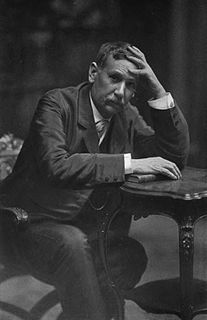A Quote by Leo Tolstoy
Related Quotes
Faith in the continuance and enhancement of the intrinsic values--faith in truth, in beauty, in friendship, in love and harmony of life--in short, faith in reason and the worth of spiritual life--such faith is only another name for faith in the persistence of spiritual individuality. For, I repeat, these values are real only as functions of personal experience and deed. To have faith in the permanence of intrinsic values is to assume the enduring reality of selves who know truth, feel beauty, who love and win spiritual harmony.
Truth has advocates who seek understanding," Richard said. "Corrupt ideas have miserable little fanatics who attempt to enforce their beliefs through intimidation and brutality... through faith. Savage force is faith's obedient servant. Violence on an apocalyptic scale can only be born of faith because reason, by its very nature, disarms senseless cruelty. Only faith thinks to justify it.
Faith and feelings are the warm marrow of evil. Unlike reason, faith and feelings provide no boundary to limit any delusion, any whim. They are virulent poison, giving the numbing illusion of moral sanction to every depravity ever hatched. Faith and feelings are the darkness to reason’s light. Reason is the very substance of truth itself. The glory that is life is wholly embraced through reason. In rejecting it, in rejecting reason, one embraces death.
Only in truth does charity shine forth, only in truth can charity be authentically lived. Truth is the light that gives meaning and value to charity. That light is both the light of reason and the light of faith, through which the intellect attains to the natural and supernatural truth of charity: it grasps its meaning as gift, acceptance, and communion. Without truth, charity degenerates into sentimentality. Love becomes an empty shell, to be filled in an arbitrary way.
Any man who stands for progress has to criticize, disbelieve and challenge every item of the old faith. Item by item he has to reason out every nook and corner of the prevailing faith. If after considerable reasoning one is led to believe in any theory or philosophy, his faith is welcomed. His reasoning can be mistaken, wrong, misled and sometimes fallacious. But he is liable to correction because reason is the guiding star of his life. But mere faith and blind faith is dangerous: it dulls the brain, and makes a man reactionary.
[I]t is truth alone-scientific, established, proved, and rational truth-which is capable of satisfying nowadays the awakened minds of all classes. We may still say perhaps, 'faith governs the world,'-but the faith of the present is no longer in revelation or in the priest-it is in reason and in science.
The goal of mankind is knowledge ... Now this knowledge is inherent in man. No knowledge comes from outside: it is all inside. What we say a man 'knows', should, in strict psychological language, be what he 'discovers' or 'unveils'; what man 'learns' is really what he discovers by taking the cover off his own soul, which is a mine of infinite knowledge.




































